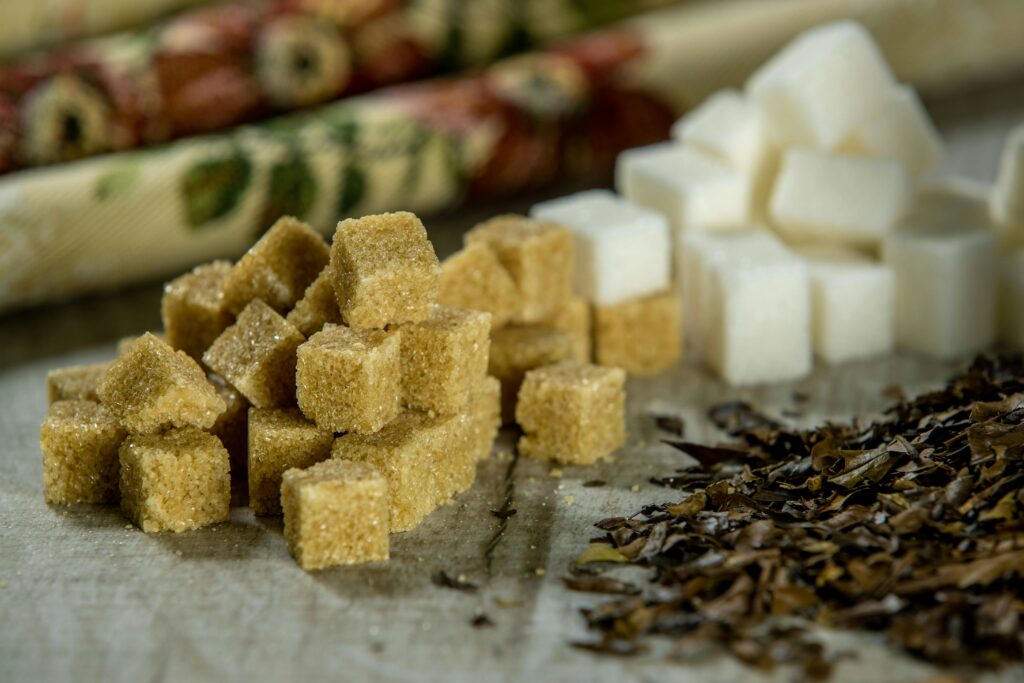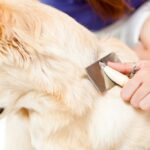Is Sugar Bad for Dogs? Perhaps the most well-known question about our furry friends is, Is sugar bad for dogs? Yes, Sugar is not toxic to dogs, and eating a lot of it won’t make them sick like chocolate or some human foods can. However, too much Sugar can cause various health issues.
Sugar has adverse effects on dogs like on humans: obesity, dental issues, and even Diabetes. That is why the amount of Sugar the canine’s body absorbs should be well understood so that they stay healthy. In this article, we probe into the different types of Sugar, Is Sugar Bad for Dogs, and what their owners can do to keep them healthy and happy.
Understanding Sugar and Its Forms
Carbohydrates contain energy, and that is what sugars are. But all sugars are not alike. Note the following ways different forms of Sugar can turn up in foods:
1. Naturally Occurring Sugars
Fruits and vegetables have sugars that come from nature. Naturally occurring sugars are safe for dogs to eat in moderation and add up to much-needed nutrients. Such as:
Apples, blueberries, and bananas are natural sugars with vitamins and fibre. As long as dogs consume modest amounts, they can be good treats.
These vegetables, such as carrots and sweet potatoes, have natural sugars and are low-calorie, making them good snacking options.
2. Refined Sugars
Refined sugars are processed sugars often added to foods. These include:
Table Sugar (Sucrose) is mainly manufactured and used in baking and cooking. It contains no nutritional value and can create medical conditions when overutilized.
Brown Sugar is precisely like white Sugar, but it contains molasses, which makes it very unhealthy for dogs.
Powdered Sugar is Sugar finely milled. It is usually used in frostings and desserts. However, dogs should avoid it in their diets.
Corn Syrup is a sweetener produced from corn that is highly concentrated with fructose. It is connected to being overweight and other health issues.
3. Sugar Alcohols
Sugar alcohols are very recently used as sweeteners for sugar-free products. Although they look safe for human use, some are toxic to dogs. The best-known one is
Xylitol: This sugar alcohol is highly toxic to dogs and has grave issues like hypoglycemia and liver failure in even tiny amounts. Available commonly in sugar-free chewing gum, mints, candies, and a few brands of peanut butter.
How Sugar Affects Dogs
Dogs suffer from numerous health issues due to the consumption of Sugar. Here are some important ones:
1. Obesity
Obesity is one of the significant complications sugar consumption causes in dogs. It will depict them in an obese manner, just like human beings.
Of course, while the Association of Pet Obesity Prevention estimates that more than half of the dogs in the United States are either overweight or obese, obesity has become a severe concern of dogs as it results in several other problems among others, including
Joint problems: The excess weight puts pressure on the dog’s joints, which are overworked and thus create arthritis and immobility disorders.
Heart Disease: Directly linked to heart disease as well as numerous heart disorders in overweight dogs.
Life Expectancy Reduced: Compared to other health conditions, overweight dogs have relatively shorter lives.
2. Diabetes
Although Sugar per se is not a disease-causing agent in dogs, it causes the condition in overweight dogs. Diabetes in dogs appears because they cannot produce ample insulin or use the available insulin effectively.
High intake of sugars creates insulin resistance, which makes regulating blood sugar very hard. There are two kinds of Diabetes in dogs:
Type I Diabetes is not so common because the pancreas does not produce insulin.
Type II Diabetes—This is the most common form found in dogs, especially in obese cases. In this form, the body does not react to the insulin produced.
3. Periodontal Diseases
Some of the major causes of dental disorders in dogs include Sugar. This is because, just as it is with human beings, the provision of Sugar leads to cavities and gum infection. Sugar reacts with bacteria in the mouth if it is fed sugary foodstuff, leading to plaque. This may lead to the following conditions:
Bad Breath: It is one of the common symptoms of dog dental problems.
Tooth Decay: Sugar causes cavities and tooth loss.
Gum Disease: Bacteria can cause a gum infection, which leads to inflammation, infections, and pain, all of which result in poor dental health.
4. Gastrointestinal Complications
Dogs that consume more sugar experience several stomach complications. Some of the symptoms are:
Indigestion: Sugar upsets the stomach of the dog and causes them discomfort.
Vomiting: Overeating Sugar promotes nausea and vomiting.
Diarrhea: Too much sugar intake causes diarrhea. Sometimes, it can be complicated even.
5. Behavioral Changes
Sugar also impacts the behavior of a dog. Dogs, like us, feel the rush of Sugar that brings about hyperactivity, but then there is the crash that may bring about:
Lethargy: While the initial stages bring high energy, lethargy starts to set in after.
Irritability: Their energy may shift, causing mood swings and irritability.
Safe Alternatives To Sugar
If you do have a concern about the above question “Is sugar bad for dogs?” on what to substitute with your pet, here are some healthy options for you to consider:
1. Fresh Fruits and Vegetables
Most fruits and vegetables can be safely given to dogs and will feed their sweet tooth without contributing to refined sugars. A few of these include:
Apples: The core and seed should be removed before being given.
Blueberries: These are low in sugars and high in antioxidants
Carrots: a tasty, crunchy snack that most dogs enjoy.
Pumpkin: Canned pumpkin (not the spiced pie filling is a great healthy alternative and helps to stimulate digestive processes)
2. Homemade Treats
Make healthy dog treats at home with fresh, natural ingredients. Use peanut butter (be sure it does not contain Xylitol) and safe fruits for your dogs to prepare irresistible, sugar-free tri-treats.
Here’s a straightforward recipe for homemade dog treats.
Peanut Butter and Banana Dog Treats
Ingredients
3. Banana: ripe
1/2 cup peanut butter is highly sure that it doesn’t contain any xylitol
1 1/2 cup whole wheat flour
1/4 cup rolled oats
1/4 cup water, as needed
Instructions
Preheat the oven to 350°F, or 175°C.
Mash the banana in a bowl and mix with peanut butter until smooth.
Add flour and oats gradually. Mix well to form a dough, adding water as needed to achieve the perfect consistency.
Roll out the dough and cut using cookie cutters to your desired shapes.
Arrange treats on a baking sheet. Bake for 15-20 minutes or until golden brown.
Let it cool down before giving it to your dog.
4. Commercial dog treats
Treat your business canine snacks with care. Look for one that specifically caters to the canine race, contains no added sugars, and has nothing harmful in the list of ingredients.
Choose products that draw all their ingredients from natural sources rather than those overrun by high fructose corn syrup.
What To Do If Your Canine Consumes Sugar
Observe the dog closely if you suspect they must have ingested a high sugar concentration. Here is how to observe them;
1. Look for Symptoms
Watch for signs of stomach upsets, such as vomiting or diarrhea. If your dog is acting strangely, consult your vet. Among the symptoms to look out for are:
Vomiting: This could happen shortly after the Sugar is consumed. Diarrhea: The diarrhea or loose stool.
Lethargy: Your dog could become more tired or lethargic than usual because of the build-up of Sugar.
2. Consult with Your Veterinarian
In case your dog ingests a massive amount of Sugar or anything sugary, especially that which contains Xylitol, then do not rush your dog to veterinary care because xylitol toxicity is so acute and potentially lethal. Some of the symptoms indicate possible poisoning by Xylitol:
Vomiting: This can be as early as 30 minutes following consumption.
Seizures: In some instances, the consumption of Xylitol has caused seizures or even liver failure.
3. Prevention of Future Incidents
Deprive sugary treats and foods from your dog. Educate house members not to feed dogs human food, especially those containing Sugar. Recommendations for the future are the following:
Store Foods Safely: Keep all human foods, especially those containing Sugar, in cabinets or containers inaccessible to your dog.
Educate Family and Relations For each family member, this information should be shared regarding the dangers of giving dogs candy and other sugary foods. Provide Healthy Alternatives: Set up a fruit or veggie display as a healthy replacement for candies.
Conclusion: Is Sugar Bad for Dogs
That’s all for today, folks; the question “Is Sugar Bad for Dogs ?” is one every dog owner should take seriously. Sugar is not poisonous, but it is toxic to a dog’s health in large doses. Be on your guard about the different forms of sugars, look out for health hazards, and with suitable alternatives, help your furry friend to live as long a healthy life as possible. Always be concerned about your pet’s nutrition, and when it appears that a question is raised about his diet, inquire from your veterinarian.
FAQs: Is Sugar Bad for Dogs
Can Dogs Eat Sugar In Small Amounts?
While dogs can tolerate small doses of natural sugars carried by fruits, their absolute sugar intake should be low since too much Sugar at any point can cause long-term health issues.
What Are the Signs That My Dog Overeats Sugar?
Some common signs are vomiting, diarrhea, hyperactivity followed by lethargy, and changes in appetite; alert your veterinarian if you suspect any problem.
Is Xylitol safe for Dogs?
No, Xylitol is fatally poisonous to dogs and can cause severe health conditions, such as hypoglycaemia and, in fact, liver failure. Always check labels for Xylitol in sugar-free products .
Should There be Fruits That the Dogs Cannot Eat?
Grapes and raisins are also toxic to dogs and should be avoided altogether. Any new food should be researched before giving it to your dog.
How Do I Maintain a Balanced Diet for My Dog?
Balance your diet: good dog food, fewer treats, and healthy fruits and veggies. Check-ups at your vet will be more helpful in monitoring your dog’s health.






